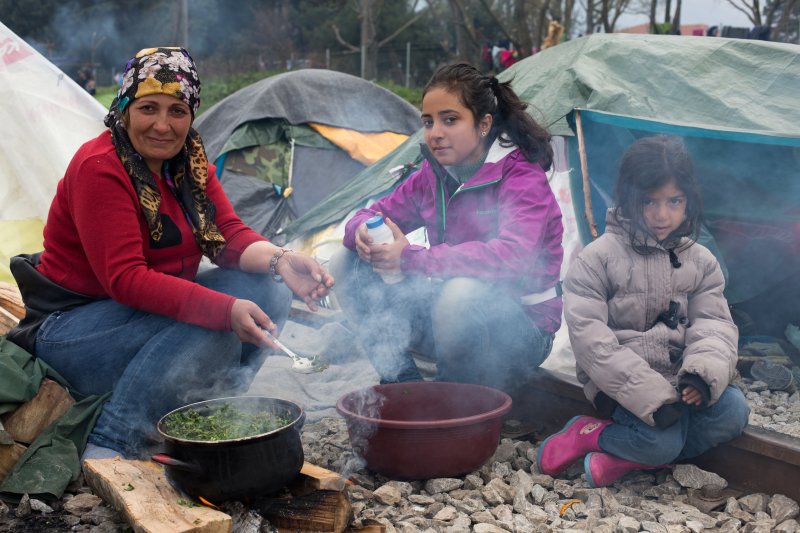1 of 17 | Many families are among the 12,000 refugees stranded in a makeshift camp in Idomeni, Greece, along the border with Macedonia in April 2016 after the border closed. Here a family from Iraq cooks. Many of the migrants are trying to reunite with relatives, who have made it to other parts of Europe. Photo by David Caprara/UPI
IDOMENI, Greece, April 8 (UPI) -- More than 12,000 refugees are stranded at a makeshift camp along the Greek-Macedonian border, where rain and limited sanitation facilities are adding misery to desperation.
Most of the refugees in Idomeni have been sleeping in small tents with sleeping bags designed for short hiking excursions. When it rains, the ground quickly becomes a mud pit, and when strong winds enter the area, the tents are easily ripped from the earth. Aid organizations such as Doctors Without Borders and the UNHCR have helped to provide better accommodations for the refugees, while several other groups have been offering food, clothing and medicine.
Portable toilets reek from overuse.
"It is our job to alleviate at least some of the suffering that the refugees are enduring, but we also have to make clear to those here that this camp is only a temporary installment," says Babar Baloch, a UNHCR spokesman. "This is not an official camp where people can stay long term."
Many of those at the camp are trying to reunite with family members who made it to countries in Western Europe and Scandinavia before the border with Macedonia closed in March.
Mawleda Aisho, a Kurdish woman from Afrin, Syria, has been at the camp with her three small children for over a month. "We are trying to reunite with my husband in Denmark," she said. "It is a struggle to keep our dignity living in conditions without proper restrooms. My only hope is to be in a safe country where my children can be in school and study -- all that we ask for is safety."
The crisis has also been a challenge for the permanent residents of Idomeni, a town that had a population of just over 200 -- mostly elderly residents -- before the migration crisis began.
"We are not at all against the refugees; we just want the [Greek] government to come up with a plan so that we can go back to normal life," said Dimitri Stoidis, a farmer whose home is directly adjacent to the refugee camp.
Land that he could once use to cultivate crops is now often strewn with garbage and smoldering campfires.
"Most of the residents in this town are elderly women, and to them this situation is quite frightening," Stoidis said.
Greece served as a passing ground along the so-called "Balkan Route" in 2015, but providing refugees with long-term assistance is a problem new to Greece, which is suffering an economic crisis of its own.
Many government-run camps are still under construction and have been unable to offer assistance equal to that of the unofficial camps, where internationally funded NGOs have a greater presence.
"Many of the refugees will go to the government-run camps and leave within days because they are unfinished," said Vicki Tsouris, a Greek volunteer working at the port of Piraeus in Athens, where over 4,000 refugees are living.
The situation at Piraeus is also trying. Volunteers and refugees said there are only three showers. Many volunteers like Tsouris are working full time to help these refugees without any pay.
In an attempt to reduce the number of refugees streaming into Europe, the European Union and Turkey agreed to a deal last month that includes a provision for the country to take back all migrants, including Syrian refugees, who entered Europe illegally.
Simply deporting them back to their home countries is not an option, as this contravenes a 1951 UN convention: "No contracting state shall expel or return a refugee in any manner whatsoever to the frontiers of territories where his life or freedom would be threatened on account of his race, religion, nationality or political opinion."
Greece began deportations to Turkey this week.
Without other options to choose from and without direct opposition from Greek police telling them to relocate, many of those stranded in Idomeni have decided to wait with the hope that the borders will open.
"We will never forget the kindness shown to us by the Greek people, but this place is not for us," said Mohammed Ashour, 23, from Aleppo, Syria. "We have nowhere to go and nowhere to go home to, and for now, we must hope and wait."
Follow David Caprara on Twitter @Caprarad.















